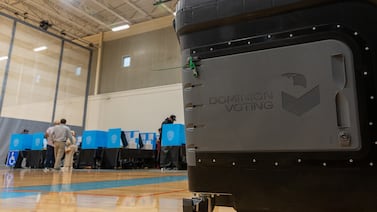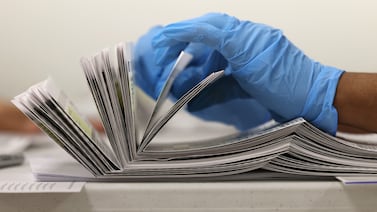Votebeat is a nonprofit news organization reporting on voting access and election administration across the U.S. Sign up for Votebeat Wisconsin’s free newsletter here.
On Election Day in Madison, nearly 200 absentee ballots slipped through the cracks. They weren’t processed or counted. Most of them weren’t even discovered until almost a month later.
And nobody seems to know exactly how the oversight occurred. Some city officials are questioning why it took so long for the error to come to light. It’s a mystery that the dozens of voters in the state capital would certainly like to see solved.
The critical disenfranchisement of 193 Madison voters on Nov. 5 resulted from mistakes at two different polling locations and the lack of a comprehensive system for poll workers to track whether they’ve counted every absentee ballot.
At a polling site in Ward 56, just west of downtown, election officials didn’t open two large carrier envelopes, used to transport absentee ballots, that contained a total of 125 ballots, Madison Clerk Maribeth Witzel-Behl said. At another site in a neighborhood slightly further west called Regent, poll workers at Ward 65 didn’t open another carrier envelope, carrying 68 absentee ballots, including one that should have been sent to a different polling place.
Normally, Witzel-Behl said, poll workers at each location “triple check” that all absentee votes have been processed before running results on the tabulator.
“We do not know why these carrier envelopes were overlooked at the polls on Election Day,” she said.
The oversight became public seven weeks after the election. Until just over a week ago, neither the Wisconsin Elections Commission nor the Madison mayor’s office knew about it.
On Dec. 26, Madison’s mayor and clerk outlined in separate statements how the ballots made it to two polling places but were somehow left unopened.
“While the discovery of these unprocessed absentee ballots did not impact the results of any election or referendum, a discrepancy of this magnitude is unacceptable,” Madison Mayor Satya Rhodes-Conway said. “This oversight is a significant departure from the high standard our residents expect and must be addressed and avoided in future elections.”
The statements left significant questions unanswered: Exactly how and when did the ballots go missing? Who was responsible for the error? Why was the news coming out over seven weeks after Election Day?
Rhodes-Conway, for one, made clear the long delay wasn’t on her account.
“Unfortunately, Clerk’s Office staff were apparently aware of the oversight for some time and the Mayor’s Office was not notified of the unprocessed ballots until December 20,” she said in a statement.
In fact, Witzel-Behl didn’t alert the mayor’s office first about the missing ballots. The clerk’s office told the Wisconsin Elections Commission about it on Dec. 18. The agency then relayed the news to the city attorney, who told the mayor’s office about it.
The commission found out about the missing ballots through a process that clerks must follow if there’s a discrepancy at the polls between the number of voters and number of ballots. The clerk’s office told the commission about the discrepancy two days before the deadline for reconciling those numbers, Witzel-Behl said. Prior to that, Witzel-Behl told Votebeat she was largely out of office.
“I personally was trying to burn through vacation time after the election, and was not aware of the magnitude of this situation,” she said. “In retrospect, I should have just cut back to standard workweeks after the election.”
Madison has decentralized absentee processing
Unlike some of Wisconsin’s bigger cities, where all absentee ballots are processed and counted at a single location, in Madison absentee ballots are sent to the polling sites corresponding to where the voters would cast in-person ballots. At those sites, poll workers typically process the absentee ballot envelopes, containing witness and voter information, before counting the ballots.
Workers at each polling location have a process for checking which voters submitted absentee ballots. They typically use an orange highlighter to mark names of voters in a poll book of city residents who were issued an absentee ballot, Witzel-Behl said, and a pink highlighter to mark those who returned their ballots. Each polling place has documents outlining the number of ballots that were returned to be counted as of the Sunday prior to Election Day, she said.
Each absentee carrier envelope has a unique identification number on the seal closing it for security reasons. Madison polling sites didn’t receive a list of seal numbers for each carrier envelope that was transported to them, but the clerk’s office stated they would provide such a list in the future. There was only a handwritten log of the seal numbers in the clerk’s office.
Despite the two polling places having a large number of absentee ballots outstanding on Election Day, the missing votes weren’t discovered until after the Municipal Board of Canvassers met on Nov. 8 to certify the election, Witzel-Behl said.
By the time one batch of uncounted ballots was discovered on Nov. 12, she said, “Staff was under the impression that it was too late for these ballots to be counted, unless we had a recount.”
Madison voters cast over 174,000 ballots in the November election.
What we know about the missing ballots
There weren’t any apparent issues with sorting or delivering the correct ballots to the polling location near downtown. But at some point after Election Day, Witzel-Behl said, an hourly employee noticed there were a lot of outstanding absentee ballots.
On Dec. 3, she said, the employee looked through materials returned from that polling location on Election Day, she said. The employee found two sealed carrier envelopes containing absentee ballots. They contained 125 unprocessed ballots.
The 68 ballots at the Regent neighborhood polling site, including the one ballot sorted and delivered to the wrong station, were contained in a sealed carrier envelope of absentee ballots.
It’s not entirely clear where that carrier envelope was throughout Election Day, but election workers later discovered it inside of a chamber of a vote tabulating machine where ballots typically go after they’re counted. Madison election officials often use that compartment to transport absentee ballots to polling sites.
At the end of the night, poll workers put secure ballot bags and other materials into the tabulators, Witzel-Behl said.
Madison clerk, mayor vow to prevent future oversights
In its letter to the election commission, the clerk’s office outlined its plans to “debrief these incidents and implement better processes” to make sure all absentee carrier envelopes are accounted for and processed on Election Day.
Rhodes-Conway also said she plans to conduct a review of the city’s election policies. Additionally, she said, the city will send letters to the affected voters to notify them of the error and apologize.
“My office is committed to taking whatever corrective action is necessary to maintain a high standard of election integrity in Madison, and to provide ongoing transparency into that process,” she said.
Alexander Shur is a reporter for Votebeat based in Wisconsin. Contact Alexander at ashur@votebeat.org.



